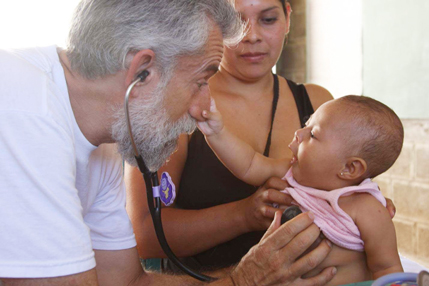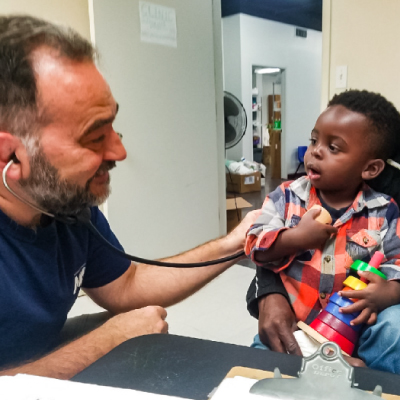- Who We Are
- Clinician Employment
- Publications
- Witness to Witness (W2W)
- Kugel & Zuroweste Health Justice Award
- Your Voice Matters: Photovoice Project
A Clinical Perspective on Compassion: Dr. Ed Zuroweste discusses the import of compassion in health care, the publication of Sir Elton John’s letter on compassion and AIDS patients
Tue, 08/04/2015 | by Claire Hutkins Seda

Pop quiz for the clinicians out there: Why did you become a clinician?
To save people’s lives;
To make money;
To discover new cures for diseases;
To show compassion to others.
Pop quiz for the clinicians out there: Why did you become a clinician?
A. To save people’s lives;
B. To make money;
C. To discover new cures for diseases;
D. To show compassion to others.
Sir Elton John, in a letter in the newly published UNAIDS report entitled “How AIDS Changed Everything,” argues that compassion and empathy aren’t extra frills in health care -- they are the foundation of clinical care, an essential part of being a practitioner. Dr. Ed Zuroweste, Migrant Clinicians Network’s Chief Medical Officer, agrees. Particularly for migrant clinicians, whose patients often face innumerable barriers to getting the care they need to regain health, compassionate care is sometimes all they have.
 “When you’re in a migrant clinic, especially with patients who have what appears to be overwhelming obstacles, you get to the point where you start to ask, ‘What am I going to do,’” without sufficient resources, said Dr. Zuroweste. He has run into such situations at medical clinics in Honduras, where he brings medical students from Johns Hopkins University School of Medicine on a two-week multidisciplinary international health elective, at least once a year.
“When you’re in a migrant clinic, especially with patients who have what appears to be overwhelming obstacles, you get to the point where you start to ask, ‘What am I going to do,’” without sufficient resources, said Dr. Zuroweste. He has run into such situations at medical clinics in Honduras, where he brings medical students from Johns Hopkins University School of Medicine on a two-week multidisciplinary international health elective, at least once a year.
It was in Honduras that one medical student -- in his final weeks of schooling -- changed his answer to the pop quiz above, which was presented to him early in his medical training. He was tasked with transferring a Honduran patient, a victim of horrendous violence with multiple gunshot wounds and significant blood loss. The student was nervous about the long drive, and feared that he didn’t have enough tools to save his life, should the patient go into cardiac arrest. Dr. Zuroweste reminded him of a tool he always has with him. “I told him, ‘You can show him compassion. You can talk to him, let him know what we’re going to do to help him,’” recalled Dr. Zuroweste. The patient survived -- and the medical student rethought his philosophy on medical care.
Dr. Zuroweste argues that the first and foremost duty of a clinician is to provide respect and compassion for all patients. “Just listening to their story is giving them an outlet,” Dr. Zuroweste explained. “If you treat them with respect and compassion, and then even if all you do is give them ibuprofin or tylenol, you can relieve some of their pain…. To listen to their plight is to help them. You don’t have to remove a brain tumor to help people in their lives.”
No longer did the medical student feel he was becoming a doctor to save people’s lives -- he then understood that his job was to provide compassion, during what is often vulnerable and frightening times in his patients’ lives.
Compassion from Sir Elton
Compassion at the core of medical care is the message in Sir Elton’s letter, the founder of Elton John AIDS Foundation, which provides funding to MCN’s Health Network to assure continuity of care for mobile AIDS patients.
“I have some good news,” the letter begins. “One of the single biggest changes that could radically improve the fight against AIDS is free. Compassion.”
In the letter, Sir Elton tells the story of one AIDS patient’s poor experiences with a nurse who stigmatizes the patient and creates barriers to proper care. “The potential human and financial costs of the nurse’s contempt are incalculable, and yet scenarios like this are playing out every day, all over the world,” reads the letter. Sir Elton believes that compassion isn’t just the key to providing proper care -- it’s imperative in defeating stigma, improving health care laws and policies, and making “health care resources work better.”
“I’m going to make it required reading for my medical students,” Dr. Zuroweste said of the letter. “We forget in medicine how healing compassion can be.”
Empathy in the exam room
Dr. Zuroweste implores his students to take an empathetic approach to patients -- and is disappointed to see that not all of his fellow clinicians have managed to maintain an empathic approach in practice. “Every time I saw a new patient, I said to myself, if this person was my parents’ age, how would I want my mother to be treated? If the patient was young, how do I want my children to be treated?” Dr. Zuroweste questioned. Putting yourself in someone else’s shoes goes a step further for Dr. Zuroweste: You have to make sure you take off your own shoes, too.
“It might be my sixth ear infection of the day. It would take me 60 seconds to diagnose it, and it’s a no-brainer for me. But for the mother and child, it may be the first ear infection they’ve ever had. Don’t blow it off -- you need to take it seriously, explain it fully, ask questions about what they’re worried about, what they’re scared about, and address those concerns,” Dr. Zuroweste explained. “And, yet, over and over again, people are treated badly. There’s no excuse for that.”
On the flipside, both Dr. Zuroweste and Sir Elton praised the many clinicians who manage to maintain their empathy. Such clinicians “see beyond the virus, the stigma and the stereotypes: they see human beings with dreams, despairs and desires just like their own,” wrote Sir Elton.
Compassion Fatigue
Yet, for all the high standards that we hold for our compassionate clinicians, the toll on the clinicians can be high. Maintaining a high level of compassion while working 50+ hours a week and seeing dozens of high-needs patients, as many migrant clinicians do, is unsustainable without significant support, said Dr. Zuroweste. “Having the ability to vent is really important,” noted Dr. Zuroweste. Associates for Health Network, MCN’s bridge case management system, meet weekly to talk through difficult cases and vent their issues. This both alleviates stress and creates a stronger community of support between the associates. “They are under a high level of stress. They hear really horrendous things. They call a patient, to discover that their patient has died. If they lose a patient with TB, they fear that the patient will infect other people or will get worse and not be able to provide for their families. It’s really stressful,” Dr. Zuroweste explained. “Sometimes we just try to be available, to have an open forum that they can bring their issues to. And it’s the same thing for health centers -- clinicians need to have an outlet, so they won’t get burned out.”
Dr. Zuroweste also praises job sharing ventures and part-time positions as effective approaches in reducing compassion fatigue by assuring sufficient down time for clinicians serving high-need patients. With the right tools in place, health centers can encourage their practitioners to keep up the compassion -- and in doing so provide the highest level of care possible.
Resources
Sir Elton John’s article is entitled “Empathy can end the epidemic” and is available at: http://newyork.ejaf.org/Docs/UN_AIDS_EJ.pdf.
UNAIDS new report is at: http://www.unaids.org/sites/default/files/media_asset/MDG6Report_en.pdf.
Journal of Compassionate Health Care provides open-access articles featuring multidisciplinary perspectives, research, and initiatives concerning the topical concept of compassionate care.
Like what you see? Amplify our collective voice with a contribution. Connect with us on Facebook or Twitter.
Return to the mail blog page -- or sign up for blog updates -- here.







